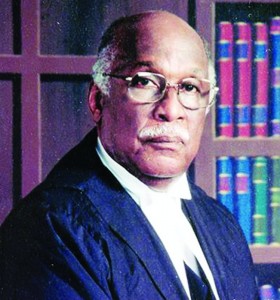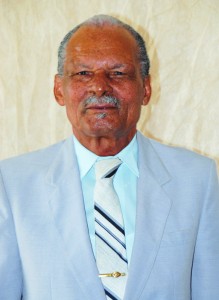

Anguilla’s Revolutionary Leader, James Ronald Webster, has described the late Karl Hudson-Phillips, the distinguished Trinidadian Lawyer, as having been like a family member in the early days of the 1967 Revolution when Anguilla struggled to be free from St. Kitts-Nevis.
Mr Webster made the comment to The Anguillian at his home in Sea Feathers this week. He was at the time recalling the days in 1968/1969 when Karl Hudson- Phillips served as Legal Adviser to him, as Chief Executive of Anguilla, and the Anguilla Council in general. The eminent constitutional lawyer reportedly died in his sleep in London on Wednesday night, January 15, 2014, where he was visiting his family. He was 80 years old. When he first came to Anguilla on October 7, 1968, both he and Mr Webster, now 87, were in their 40s.
The brief interview between Mr Webster and The Anguillian went as follows:
Q. How did you accept the news about the passing of Karl Hudson- Phillips?
A. Well, we have lost someone who had been of much value to us during the early days of the Anguilla Revolution. He was like a family member, we have lost. When I called on him to advise me, he would do just that so I had no problem with him. The good part about it was that he was always willing to volunteer to give his assistance. He wanted to come to Anguilla on several occasions, but he was busy so I told him when he was ready to give me a call.
Q. Do you remember any particular incident in which he came to your assistance?
A. Oh yes, I remember when he told Lord Caradon that I have my dogs tied and don’t allow me to loose them. He [Caradon] shrank back and said he didn’t come for that purpose. He had come to help, not to divide but for us to work together for the benefit of the island. Thank God he [Caradon] had helped. He said it was not part of the British Government’s purpose to put us back under an administration we did not want. He said he was here to prevent that and he really was.
Q. How did you get to know about Karl Hudson-Phillips?
A. Through Dr Billy Herbert who introduced him to me. Mr Phillips and I kept in contact with each other for some time. He was doing his work and I was doing mine and we corresponded. I am so sorry to hear about his passing.
A context in which Mr Webster’s statement that Mr Phillips was like a family member, may be that on one of his visits to Anguilla he stayed at the residence of Webster’s sister, Mrs Olive Hodge, who cherishes that occasion.
Among the archives in the Heritage Collection Museum is a report by Mr Phillips to the Anguilla Council dated December 9, 1968. In that document, he reported on the constitutional talks in London between the Governments of Anguilla, the United Kingdom and St Kitts-Nevis which he attended.
Some of the excerpts from that report are as follows: “Discussions were held with the Chief Executive [Ronald Webster] on 7th October, 1968 and with the Council of Anguilla on 8th October, 1968…Counsel proceeded to London…and immediately proceeded to work on the following matters: (a) documentation for the Anguillan delegation; (b) research into the constitutional matters touching the status of Anguilla; (c) arrangements for the arrival of the Chief Executive, Mr Ronald Webster, on Friday, 11th October, 1968…
“The delegation consisted of Mr Ronald Webster, the Rev Leonard Carty and Mr Karl Hudson-Phillips of Counsel and the talks were commenced on Monday, 14th October at the Offices of the Commonwealth Relations Office at Central Buildings, Westminster… (The St Kitts delegation was led by Premier Robert Bradshaw.)
“Counsel for the Anguillan delegation suggested that the issues be placed in the broad categories of short term objectives and long term goals and informed the Under-Secretary that it was the duty of the delegation at the outset to emphasise that it had clear instructions to press for complete severance from the state of St Kitts/Nevis and Anguilla…”
Mr Phillips reported that some of the other issues raised at the meetings were as follows: “The release of monies of Anguillians in saving bank accounts in St Kitts with interest up to 30th May, 1967; payment of pensions to Anguillan residents; [and] the question of external aid for Anguilla not being channelled through St Kitts.”
He also reported that: “The initial reaction of the Hon Mr Bradshaw was that he would not be ‘interrogated’ and referring specifically to Counsel for the Anguillan delegation, stated ‘you know nothing about all of this’. Counsel for the Anguillan delegation unsuccessfully attempted to persuade the Hon Mr Bradshaw of the irrelevance of personal remarks.”
The talks in London between the Anguilla and the St Kitts delegations “proved fruitless”, Karl Hudson-Phillips finally reported, while the British newspapers came out with the headline “Talks Deadlocked”.
Mr Webster said that Mr Phillips did a good job in advising, and speaking on behalf of, the Anguilla delegation during the London talks and at other occasions. He has expressed thanks to him for his advice during a most difficult period in Anguilla’s history and has offered his condolences to the surviving relatives of the late eminent Caribbean Lawyer.








